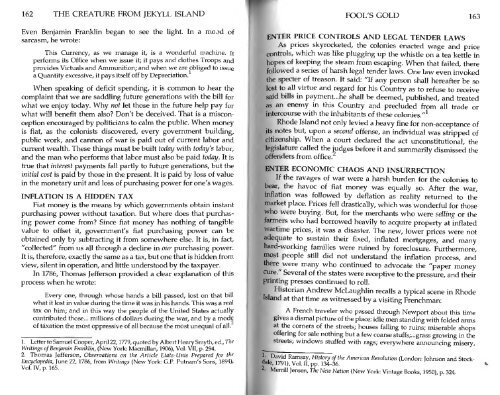Create successful ePaper yourself
Turn your PDF publications into a flip-book with our unique Google optimized e-Paper software.
162 THE CREATURE FROM JEKYLL ISLAND<br />
FOOL'S GOLD 163<br />
Even Benjamin Franklin began to see the light. In a mood of<br />
sarcasm, he wrote:<br />
This Currency, as we manage it, is a wonderful machine. It<br />
performs its Office when we issue it; it pays and clothes Troops and<br />
provides Victuals and Ammunition; and when we are obliged to issue<br />
a Quantity excessive, it pays itself off by Depreciation.<br />
When speaking of deficit spending, it is common to hear the<br />
complaint that we are saddling future generations with the bill for<br />
what we enjoy today. Why not let those in the future help pay for<br />
what will benefit them also? Don't be deceived. That is a misconception<br />
encouraged by politicians to calm the public. When money<br />
is fiat, as the colonists discovered, every government building,<br />
public work, and cannon of war is paid out of current labor and<br />
current wealth. These things must be built today with today's labor,<br />
and the man who performs that labor must also be paid today. It is<br />
true that interest payments fall partly to future generations, but the<br />
initial cost is paid by those in the present. It is paid by loss of value<br />
in the monetary unit and loss of purchasing power for one's wages.<br />
INFLATION IS A HIDDEN TAX<br />
Fiat money is the means by which governments obtain instant<br />
purchasing power without taxation. But where does that purchasing<br />
power come from? Since fiat money has nothing of tangible<br />
value to offset it, government's fiat purchasing power can be<br />
obtained only by subtracting it from somewhere else. It is, in fact,<br />
"collected" from us all through a decline in our purchasing power.<br />
It is, therefore, exactly the same as a tax, but one that is hidden from<br />
view, silent in operation, and little understood by the taxpayer.<br />
In 1786, Thomas Jefferson provided a clear explanation of this<br />
process when he wrote:<br />
Every one, through whose hands a bill passed, lost on that bill<br />
what it lost in value during the time it was in his hands. This was a real<br />
tax on him; and in this way the people of the United States actually<br />
contributed those... millions of dollars during the war, and by a mode<br />
of taxation the most oppressive of all because the most unequal of all-<br />
1 Letter to Samuel Cooper, April 22, 1779, quoted by Albert Henry Smyth, ed., The<br />
Writings of Benjamin Franklin, (New York: Macmillan, 1906), Vol. VII, p. 294.<br />
2. Thomas Jefferson, Observations on the Article Etats-Unis Prepared for the<br />
Encyclopedia, June 22, 1786, from Writings (New York: G.P. Putnam's Sons, 1894),<br />
Vol. IV, p. 165.<br />
ENTER PRICE CONTROLS AND LEGAL TENDER LAWS<br />
As prices skyrocketed, the colonies enacted wage and price<br />
controls, which was like plugging up the whistle on a tea kettle in<br />
hopes of keeping the steam from escaping. When that failed, there<br />
followed a series of harsh legal tender laws. One law even invoked<br />
the specter of treason. It said: "If any person shall hereafter be so<br />
lost to all virtue and regard for his Country as to refuse to receive<br />
said bills in payment-he shall be deemed, published, and treated<br />
as an enemy in this Country and precluded from all trade or<br />
intercourse with the inhabitants of these colonies." 1<br />
Rhode Island not only levied a heavy fine for non-acceptance of<br />
its<br />
notes but, upon a secmd offense, an individual was stripped of<br />
citizenship. When a court declared the act unconstitutional, the<br />
legislature called the judges before it and summarily dismissed the<br />
offenders from office.<br />
ENTER ECONOMIC CHAOS AND INSURRECTION<br />
If the ravages of war were a harsh burden for the colonies to<br />
bear, the havoc of fiat money was equally so. After the war,<br />
inflation was followed by deflation as reality returned to the<br />
market place. Prices fell drastically, which was wonderful for those<br />
who were buying. But, for the merchants who were selling or the<br />
farmers who had borrowed heavily to acquire property at inflated<br />
wartime prices, it was a disaster. The new, lower prices were not<br />
adequate to sustain their fixed, inflated mortgages, and many<br />
hard-working families were ruined by foreclosure. Furthermore,<br />
most people still did not understand the inflation process, and<br />
there were many who continued to advocate the "paper money<br />
cure." Several of the states were receptive to the pressure, and their<br />
printing presses continued to roll.<br />
Historian Andrew McLaughlin recalls a typical scene in Rhode<br />
Island at that time as witnessed by a visiting Frenchman:<br />
A French traveler who passed through Newport about this time<br />
gives a dismal picture of the place: idle men standing with folded arms<br />
at the corners of the streets; houses falling to ruins; miserable shops<br />
offering for sale nothing but a few coarse stuffs;...grass growing in the<br />
streets; windows stuffed with rags; everywhere announcing misery,<br />
| David Ramsay, History of the American Revolution (London: Johnson and Stock-<br />
Jale, 1791), Vol. II, pp. 134-36.<br />
2<br />
- Merrill Jensen, The New Nation (New York: Vintage Books, 1950), p. 324.


